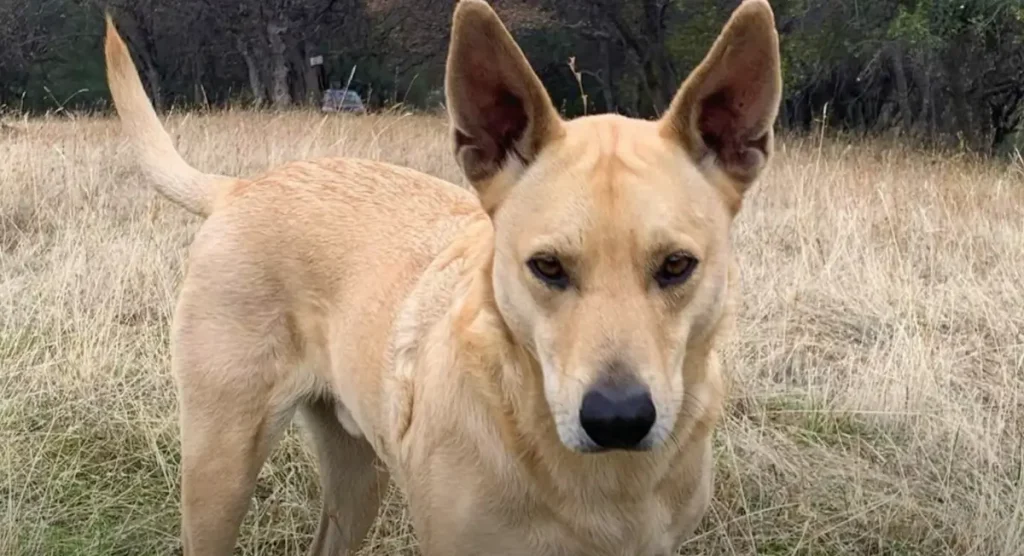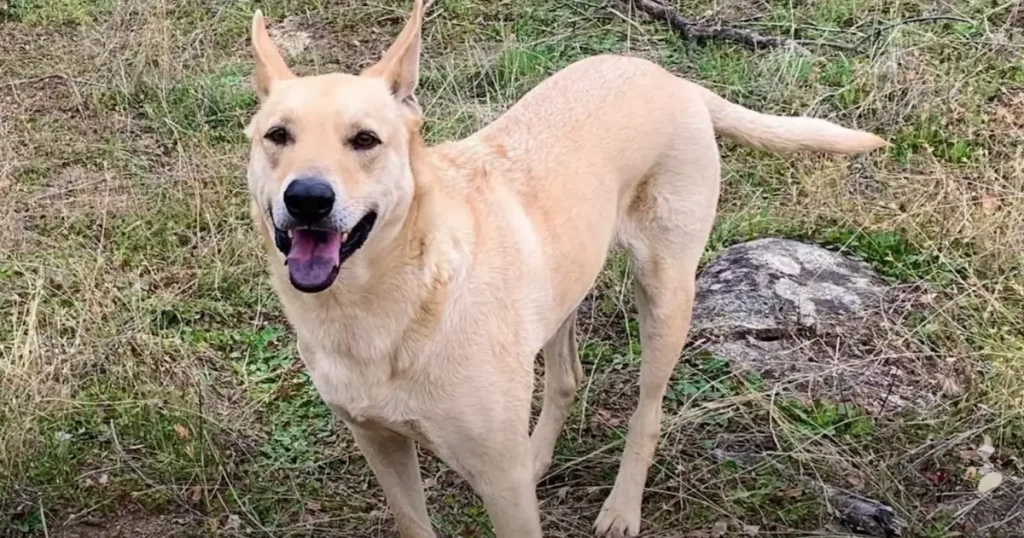As you stand on the brink of discovering a canine enigma, let’s unravel the mystery of the Carolina Dog, a breed that walks the line between domestication and wild spirit.
You may find yourself intrigued by their dingo-like demeanor, a whisper of ancient dog breeds that roamed the American Southeast long before European breeds set paw on the continent. With their sharp intelligence and strong survival instincts, they’re not your average pet; their versatility and adaptability might surprise you.
Considering the potential of welcoming a Carolina Dog into your life, you’ll want to learn more about their unique needs and characteristics. What sets the Carolina Dog apart from the sea of familiar breeds, and how might their wild roots reflect in their behavior and care?
Stay with me, and let’s explore the untamed heart of the American Dingo and why they might—or might not—be the perfect fit for your home.
- Noise Level
- Energy
- Sociability
- Trainability
- Care
- Health
Overall
Summary
The Carolina Dog is known for its moderate noise level, high energy, and sociable nature. While they may require some patience in training, they are relatively low maintenance and generally enjoy good health.
Carolina Dog: Traits, Temperament, and Care Guide
The Carolina Dog, often called the American Dingo, boasts a unique combination of traits. These include a sharp intelligence, a reserved yet loyal temperament, and a need for consistent exercise. Prospective owners must be willing to commit to an active care regimen.
Their upright ears don’t just add to their alertness. They also indicate an intelligent breed that craves exercise and mental stimulation.
Exploring the Characteristics of the Carolina Dog
While considering the Carolina Dog’s need for a stimulating environment, let’s examine the breed’s distinct physical and behavioral characteristics that reflect its ancient lineage and adaptability.
| Aspect | Description | Importance |
|---|---|---|
| Physical Build | Wedge-shaped head, agile body | Reflects adaptability |
| Temperament | Loyal, reserved, intelligent | Suits family life |
| Needs | Regular exercise and mental | Essential in the U.S. |
Carolina Dogs demand regular exercise and mental stimulation, crucial for their well-being in American homes.
Carolina Dog: A Comprehensive Profile and Guide
You’ve learned about the unique characteristics of the Carolina Dog, but to truly understand this breed, a comprehensive profile is essential.
Analyzing their history, you’ll find that their lineage traces back to free-ranging dogs that closely resemble the Australian Dingo.
In assessing their needs, remember that their intelligence and energy demand consistent engagement through exercise and mental challenges.
Everything You Need to Know
Diving into the Carolina Dog’s profile reveals a rare and ancient breed, embodying a rich history as a once-wild canine native to the southeastern United States. These dogs are recognized for their distinctive wedge-shaped head and sport upright ears with an agile body. They are known for a loyal, reserved temperament and are intelligent, craving mental stimulation. A testament to their unique heritage, they’re devoted companions, enriching lives with their storied past.
Discovering the Temperament
Most Carolina Dogs exude a blend of loyalty and reserve, often demonstrating their intelligence and keen awareness in familiar settings. Understanding the behavior of Carolina Dogs is crucial for successful integration into your life.
Their temperament and socialization require consistent guidance. Implement tips for training Carolina Dogs, such as regular exercise and mental challenges, to harness their adaptability and ensure a well-rounded family companion.

Carolina Dog: Is It a Good Fit for Families?
You might wonder if the Carolina Dog, with its loyal nature and intelligence, is the right addition to your family.
Their need for regular exercise aligns well with active households, ensuring they’re a joy rather than a challenge for energetic families.
Moreover, their unique background as a once-wild breed offers a rich educational experience for kids and adults, fostering a deep appreciation for canine history and behavior.
Assessing Carolina Dog’s Compatibility with Families and Kids
While Carolina Dogs are known for their loyalty and reserved nature, they can become excellent family pets when given proper socialization and training from an early age.
Exploring family-friendly traits, understanding socialization needs, and assessing child-dog interaction are key. Consider:
- Early socialization with kids
- Training for good manners
- Consistency in rules and boundaries
- Supervised interactions with children
- Activities to channel energy and intelligence
Carolina Dog Versatility
Given their adaptability, Carolina Dogs excel in various canine sports and activities, offering their owners an ideal blend of physical and mental engagement.
Exploring versatility of Carolina dogs in different sports reveals their agility and stamina.
As therapy animals, they provide comfort with their gentle demeanor.
Their keen instincts and resourcefulness are invaluable in search and rescue operations, showcasing their profound adaptability and deep-rooted desire for purposeful connection.
Obedience Tips for Carolina Dogs
When training your Carolina Dog, beginning early is crucial, as research suggests that puppies are most receptive to learning between 3 to 14 weeks of age.
You’ll find that using treats and praise as positive reinforcement can significantly boost your child’s motivation and willingness to follow commands.
To ensure lasting obedience, maintain consistency in your training approach and integrate regular socialization to foster adaptability and good behavior.
Effective Training Strategies
Training your Carolina Dog effectively hinges on leveraging positive reinforcement—treats and praise—to motivate and reward them, as this breed’s intelligence and eagerness to please make them responsive to such techniques.
| Strategy | Benefit |
|---|---|
| Positive Reinforcement | Enhances learning and strengthens obedience |
| Mental Stimulation | Keeps their intellect engaged and satisfied |
| Consistent Leadership | Fosters respect and clear understanding |
| Regular Socialization | Promotes well-mannered behavior |
| Reward-Based Obedience | Taps into their natural loyalty |
Carolina Dog Exercise and Grooming Needs
To maintain their health and happiness, Carolina Dogs require daily exercise, including activities such as walks and playtime, and mental challenges to keep their minds sharp.
The importance of mental stimulation can’t be overstated; interactive toys and training are crucial.
Tips for effective grooming include regular brushing and as-needed baths.
For the best outdoor activities, consider hiking or fetch to satisfy their energy.

Health Considerations
Considering bringing a Carolina Dog into your life, it’s crucial to know their typical health profile and longevity.
Though generally robust, they’re susceptible to hip dysplasia, making periodic hip evaluations a vital part of their care.
Furthermore, you must be vigilant about skin conditions and maintain a consistent dental and weight management routine to support their overall well-being.
Common Health Issues and Lifespan
Understanding the common health issues and expected lifespan of Carolina Dogs is crucial for prospective owners to ensure these dogs lead a full and healthy life.
Carolina Dogs have a lifespan of 12-15 years and are generally robust. However, they are prone to certain health conditions such as hip dysplasia, patellar luxation, and genetic conditions like progressive retinal atrophy.
To ensure their well-being, regular vet check-ups, a balanced diet, and ample exercise are pivotal care considerations.
Is Carolina Dog the Right Dog for You?
Determining whether a Carolina Dog is the ideal match for your household necessitates evaluating its unique characteristics and considering whether you can meet its needs for exercise and companionship.
Debunk common misconceptions about this dog breed name and ensure you find a reputable breeder.
Introducing a Carolina Dog to other pets requires patience and understanding of their reserved nature to foster a sense of belonging for all.
Alternatives for Carolina Dog: Hardy and Versatile Medium-Sized Breeds
For those who love the Carolina Dog’s hardiness and versatility, these medium-sized breeds offer a similar blend of robustness and adaptability.
| Similar Dogs | Short Description |
|---|---|
| Australian Kelpie | An Australian breed, adept at herding with high energy and intelligence. |
| Australian Shepherd | Versatile and energetic, excellent for herding and dog sports. |
| Catahoula Leopard Dog | Known for its distinctive ridge and courage, it is great for active families. |
| Rhodesian Ridgeback | Known for its distinctive ridge and courage, great for active families. |
Conclusion
As you weigh the duality of the Carolina Dog’s wild roots against its domestic adaptability, consider the breed’s need for mental engagement and physical activity. This ancient breed, though independent, thrives with consistent training and a stable family environment.
Balancing their health needs with your lifestyle is critical. Analyze your readiness to meet their exercise and grooming demands before welcoming an American Dingo into your life, ensuring a harmonious bond between the primal and the present.
Frequently Asked Questions
Are Carolina Dogs Part Dingo?
You’re exploring if Carolina dogs share dingo ancestry. Genetic research and behavioral comparisons support this possibility. It’s a complex puzzle, but you’re part of a community seeking to unravel these ancient canine connections.
Is an American Dingo a Good Family Dog?
The American Dingo’s temperament suits family life, provided you prioritize socialization and meet their exercise needs. Their loyalty and intelligence forge strong familial bonds, enriching your collective sense of belonging.
Is the Carolina Dog a Rare Breed?
Yes, you’re eyeing a rare breed. The Carolina Dog’s origins and limited breed recognition contribute to its scarce conservation status, making it a unique companion for those seeking a sense of belonging.
Is a Carolina Dog a Good Pet?
You’ll find that a Carolina Dog’s loyalty fits the adage, “Man’s best friend.” Their temperament traits, exercise needs, and training challenges require dedication, but they’ll integrate seamlessly into your pack with commitment.
